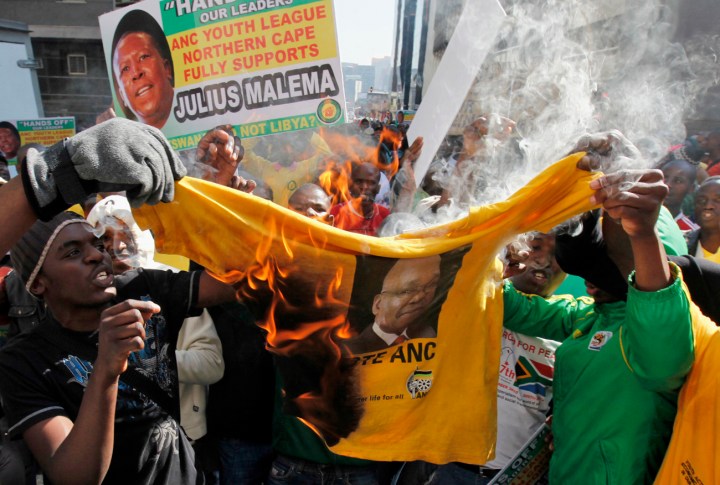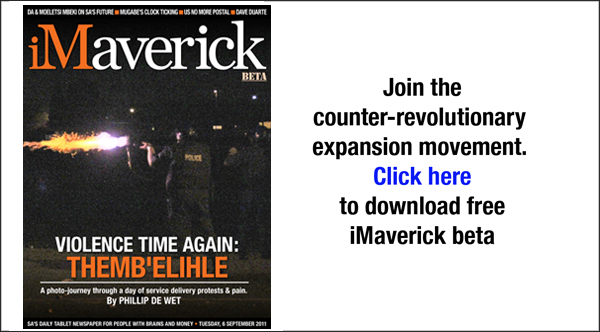Politics
Rhodes’ Jane Duncan on how the ANC created ‘that monster’, the ANCYL

A failure by the ANC to take its own politics seriously has spawned the unruly mess that is the ANCYL, says Duncan, who believes that when it comes to discipline the ruling party is doing too little too late. By MANDY DE WAAL.
Johannesburg is counting the cost of last week’s destructive ANCYL protests, and inner-city law firm BDK is threatening to form a business coalition that will launch legal action to ensure the Luthuli House disciplinary hearing against Julius Malema and co is moved out of the city centre. As police investigate who organised the protest and whether the violence was premeditated, many South Africans are asking how the ANC let things get so out of hand.
Jane Duncan, Highway Africa Chair of Media and Information Society at Rhodes’ School of Journalism says the unchecked, unruly power that is the ANCYL exists because of a contradiction within ANC politics. “Historically the ANC has produced excellent leaders who have extremely high levels of political sophistication, but at the same time it is a populist organisation,” says Duncan.
While the ANC delivered excellent leaders in the past, the drive for critical mass has seen the adoption of the lowest common denominator because building party membership takes precedence over everything else. Duncan says this realises a ruling party more concerned with numbers than the quality of party political membership.
“The ANC is focused on critical mass and it will not expel members because it doesn’t want to affect that critical mass in any way,” says the former head of the Freedom of Expression Institute. “The ANC has emphasised the width of numbers rather than the depth of its politics, and has also done precious little to educate the party’s ranks. In this it hasn’t taken its own politics seriously, which has enabled the rise of demagogues like a Julius Malema.”
In stark contrast Duncan offers the example of the New Unity Movement, which she says is an extremely tight, disciplined organisation. “The New Unity Movement inducts people into politics, has reading groups and is very serious about ensuring clarity on what the organisation stands for. This ensures that members know how to take the politics of the New Unity Movement forward,” says Duncan. “We don’t see this in the ANC, which doesn’t do much to ensure members understand and respect the political traditions of the ANC. By not having done its groundwork with members, the ANC has created the monster that is the ANCYL.”
Duncan says the extent of Julius Malema’s support is questionable as evidenced by the scale of protests outside of Luthuli House where the ANCYL leadership faced off against the ANC’s national disciplinary committee. But what supporters lacked in numbers they made up for with brutal force.
City Press reports that Jacob Lebogo, ANCYL general secretary of Limpopo and a staunch Malema supporter, organised what has been called “the most violent ANC protest since 1994”. Lebogo denies he was the man behind the violent protest, but a police investigation into the matter may reveal greater clarity.
When questioned about discipline and unruliness within the ANCYL, Duncan says that there is a good argument to be made that the ANC has left matters too late. “With discipline you need to be consistent. When it comes to politics you have to maintain consistency in terms of when you discipline and how you discipline. The ANC has allowed so much to slip through the net that it creates conditions for anarchy in the organisation. It has failed to stem the growing trend (towards) anarchy and has shot itself in the foot, because it has made it exceedingly difficult to do something about this now.”
The ANC has instituted disciplinary hearings against Malema and co in an environment where there is rampant unemployment, the poverty gap is widening, leadership largesse is continually exposed, and where South Africa looks set to face a second back-to-back recession. “The youth feel the effect of a recession more readily than other parts of our society. Given how alienated South Africa’s youth are feeling this creates conditions for the Malemas of this world to thrive,” Duncan says. “These conditions are going to make it difficult for the ANC to stop the mobilisation of demagogues.”
Duncan says the lack of diversity in the South African media landscape makes Maelma’s voice the loudest. “Because the majority of South Africans aren’t given a voice in the media, the Malemas of this world speak on their behalf.” Duncan says the lack of media diversity is something that local civic organisations and media policy makers need to tackle, if they don’t want this issue to be hijacked by the ANCYL for its own end.
“The ANCYL statement which recently called for a boycott of Media24 is very opportunistic in that it attacks Media24’s dominance but for all the wrong reasons. I too share concerns that Media24 dominates the landscape, but it is a very delicate condition and merely raising it could give the ANCYL even more ammunition to fire at Media24,” she says.
“We all have to confront the issue of media dominance and Media24, which commands just under 40% of total circulation of print media in South Africa, for democratic reasons. The bigger media groups grow, the more difficult it is for the transformation of the landscape and for the growth of diversity. This issue must be raised by those of us who are concerned about democracy and transformation,” says Duncan. “The tragedy is that in South Africa we haven’t even begun discussions about media-ownership caps. This discussion needs to start because the current environment makes it very difficult for independent media to thrive,” she says.
Duncan cites the example of GoldNet News, a Welkom paper which couldn’t compete against Media24 and whose case is to be heard by the Competition Tribunal. The founder of GoldNet News alleges that Media24 abused its dominant position in the market by undercutting advertising to such a degree that it forced GoldNet News to go under.
“There are also many cases of independent newspapers that have struggled to survive and closed in the face of Caxton. We may not like what the ANCYL has to say, but we can’t run away from the fact that we have a very concentrated media. We need to raise these issues to defend the democratic content of media diversity so as not to allow this issue to be hijacked or exploited by the likes of the ANCYL,” says Duncan.
Duncan says the league and the ANC are interfering in issues they shouldn’t interfere in, and abandoning important crusades that they should address. “The ANC is trying to control media content through the Media Appeals Tribunal and the Protection of Information Bill, and the ANCYL is merely following this example. The ANC professes to be committed to media diversity but it hasn’t even raised the possibility of intervening with regulations that could promote diversity.”
As the ANC tries to muzzle inconvenient content that exposes the underbelly of the organisation, community newspapers are dying like flies in the face of the recession and an independent, grass-roots media is under threat. “If big media groups are struggling with the recession, smaller players are struggling much, much more. It is perfectly acceptable for governments to intervene in media ownership in order to guarantee diversity, because if they don’t you get a situation where large groups dominate and the smaller guys get squashed,” Duncan says.
But the ANC and the ANCYL seem to be more interested in regulating information flow and controlling media content because flourishing media diversity would spawn a new slew of voices demanding to be heard. And the messages new independent media may bring could be even more inconvenient than what is currently being presented by the established media. DM
Read more:
- Juju’s general, in City Press;
- Meet Juju’s ‘chief enforcer’, in City Press;
- Violence Inc: Luthuli House scenes a bitter taste of Polokwane fruits, on Daily Maverick;
- Media groups to be probed for collusion, in Mail & Guardian.






 Become an Insider
Become an Insider